
Main Page
Alphabetical Menu
Chronological Menu
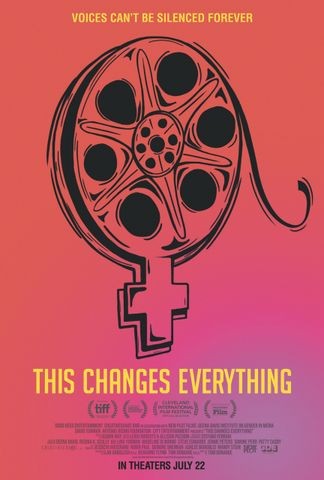
This Changes Everything tackles the human rights issue of the underrepresentation of women in Hollywood. Director Tom Donahue interviews actors, directors and others from the film industry to trace the history of the feminist movement in Hollywood and to show how dire the status quo is. Women are objectified, under-hired and under-paid. Patty Jenkins' Wonder Woman made hundreds of millions at the box office which shows that female directors are just as capable of making a financially successful film as male directors are and that the demand is there for films made by female directors, so what's stopping the Hollywood studios from hiring more female directors to helm tentpole movies? Unfortunately, This Changes Everything fails to answer that question---perhaps because no current studio executive agreed to be interviewed. Sherry Lansing, the former CEO of Paramount, is the only exec interviewed. Donahue includes too many talking heads that continue to reinforce its conclusion that more has to be done to combate gender disparity in Hollywood, but the interviews don't provide enough insight that gets to the root of the human rights issue. Also, there's not enough balance of perspectives. Can't it be argued that male actors are just as objectified in Hollywood as female actors? We're living in shallow, dehumanizing times, after all, so if we continue to be shallow as a society, how will there be any paradigm shift when it comes to treating women as human beings? No one male, woman nor anyone in between deserves to be dehumanized. This doc is a little too hopeful and naive. Why didn't Donahue interview sociologists or sociopsychologists to dig deeper beyond just letting all the familiar Hollywood faces have a platform to briefly share their thoughts, feelings and experiences? Yes, the topic that This Changes Everything adresses is indeed important, but the film itself barely scratches the surface. Catching Sight of Thelma and Louise and Half the Picture are far more insightful docs. It opens at IFC Center via Good Deed Entertainment. The Art of Racing in the Rain 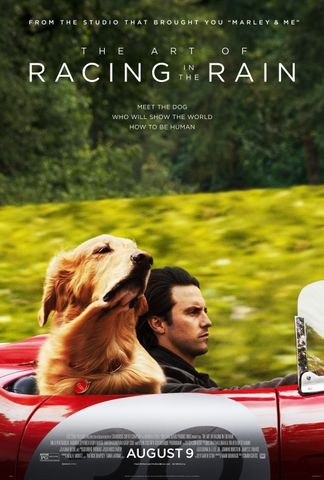 Denny Swift (Milo Ventimiglia), a race car driver, adopts a Labrador Enzo (voice of Kevin Costner). He falls in love with Eve (Amanda Seyfried), marries her, and soon enough she gives birth to their daughter, Zoe (Ryan Kiera Armstrong). Denny faces a legal battle when Eve's parents, Maxwell (Martin Donovan) and Trish (Kathy Baker) fight for the custody of Zoe after Zoe is diagnosed with brain cancer. The Art of Racing in the Rain is essentially a dull Lifetime movie-of-the-week. The clunky screenplay by Mark Bomback, based on the book by Garth Stein, tries to be wise, funny and poignant, but very few of those beats actually land because too few scenes ring true. It tries to cover a lot of ground with so many subplots that it makes you feel like you're watching four movies all at once. Is it a story of a man and his dog? Is it a story about a workaholic husband and his ailing wife? Or about Denny's desperate fight to gain custody of Zoe? With a more organic screenplay, this could've been an engrossing dramedy that makes you both laugh and cry. The dog looks cute, but he's saddled with preachy voice-over dialogue as the narrator. Is this a movie for kids or for adults? The narration seems geared more for kids, but the film's themes are too dark and dreary to entertain kids while the drama itself remains too shallow, schmaltzy and undercooked to entertain adults. The cast tries their best to rise above the weak screenplay. Milo Ventimiglia is charismatic and Amanda Seyfried is charming. Kathy Baker, who's among the most underrated actresses of our time, gives the most radiant performance in the film, and her character has the most believable arc. There's a courtroom scene towards the end of the film that strains credibility, but her performance feels genuinely moving and truthful. Something feels off about Kevin Costner voicing Enzo because it fails to breathe life into the cute dog. Enzo is no Marely, Lassie, Old Yeller nor Beethoven. He's a plot device, and with the narration, it feels like the filmmakers are trying to hard to please the audience. There's too little nuance or subtlety. Even the metaphor in the film's title is spoon-fed to the audience. At a lengthy running time of 1 hour and 49 minutes, The Art of Racing in the Rain is undercooked, overstuffed and anemic with a contrived, clunky screenplay that will neither make you laugh nor cry. 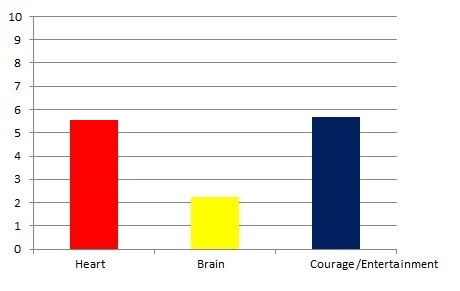 The Kitchen 
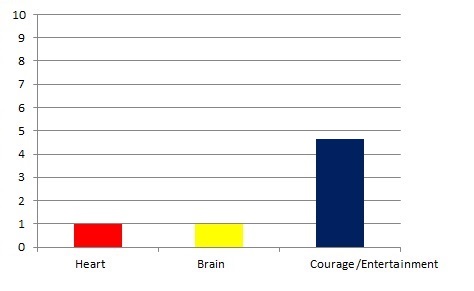 Light of My Life A father (Casey Affleck) and his daughter, Rag (Anna Pniowsky), struggle to survive in a forest after a plague wipes out almost all of the female population. He disguises Rag as a boy to keep her safe. Light of My Life is a lean, slow-burning post-apocalyptic drama that lacks suspense, imagination and depth. It's alright for plot and character development to be wafer thin as long as there are palpable emotions created through the screenplay and/or the performances. Unfortunately, writer/director Casey Affleck fails to generate any warmth or poignancy through the interactions with the father and daughter. The father, who's nameless and has too little backstory, has a few monologues that feel long-winded. The melancholic tone of the film quickly becomes tedious without nearly enough comic relief or wit. Even serious war films like Saving Private Ryan have some comic relief. Affleck should be commended, though, for trusting the audience's patience because the pace moves very slowly which is refreshingly un-Hollywood, but the audience's patience isn't rewarded with anything memorable by the end. There's very little that's interesting about the relationship between the father and his daughter. Even though he disguises her as a male, Light of My Life has nothing insightful to say about gender identity or anything along those lines that would make the film remotely provocative or intriguing. The performances are mediocre at best, but to be fair, the screenplay doesn't give neither Affleck nor Pniowsky enough to shine. On a positive note, Light of My Life does have some atmosphere to spare with its setting in a snowy forest, and there's a sense of dread from start to finish. Atmosphere alone, though, isn't enough to keep a film afloat. It's hard to avoid comparing it to superior survival tales about father & child relationships such as The Road and Leave No Trace which are far more engrossing, thrilling and powerful than the often lethargic, forgettable and underwhelming Light of My Life. A truly great film ought to have a perfect blend of Truth and Spectacle. It's possible to find Truth within Spectacle and Spectacle within Truth, but this film doesn't have enough of both of those essential elements, so it falls flat more often than not. At a running time of nearly 2 hours, it feels more like 4 hours long. The Peanut Butter Falcon 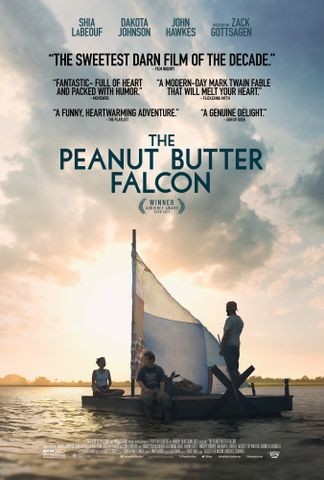 Zak (Zack Gottsagen), a 22-year-old man with Down syndrome, lives in a nursing home where Eleanor (Dakota Johnson) takes care of him. He dreams of becoming a wrestler and attending the wresting school of Clint, a.k.a. The Salt Water Redneck (Thomas Haden Church). With the help of a fellow patient, Carl (Bruce Dern), he escapes the nursing home in search of The Salt Water Redneck. During his trek, he crosses paths with and befriends Tyler (Shia LaBeouf) who's on the run from the law. Meanwhile, Eleanor desperately searches for Zak. The Peanut Butter Falcon is a heartwarming, tender and funny adventure that earns its uplift without any sugar-coating, preachiness nor schmaltz. Co-writers/directors Tyler Nilson and Michael Schwartz have woven a refreshingly witty and unconventional screenplay blending comedy, drama and thrills sans unevenness. The characters are flawed, yet likable and true-to-life. Most importantly, though, they never become caricatures. Zak, for instance, played by a mentally disabled actor, is a very endearing character because he's a complex human being. It's quite a feat for filmmakers to treat its characters as fully fleshed human beings rather than just one-note characters who are merely there to move the plot forward. They also do a great job of not making fun of people with mental disabilities. There should be more roles like Zak's in modern cinema, and more filmmakers who hire actors with disabilities, whether they're physical or mental ones. Fundamentally, this film isn't about someone with a mental disability; it's about three human beings who form a bond of friendship with each other while going on an adventure. The less you know about the film's plot the better because there some pleasant surprises to be found, especially when it comes to the lively supporting characters, i.e. a blind man with a shot gun. Anyone with a dream could be able to relate to Zak because, although he yearns to be a wrestler and risks his life to go on an adventure to meet his wrestling idol, the dream of wrestling is a metaphor for any kind of dream, and the adventure itself is also a metaphor for the journey one takes to try to achieve one's dream. There's some humor that feels a bit silly, but there's enough witty dialogue to compensate for that. Beneath the film's thrills, beautiful scenery, comedy, you'll find a warm, beating heart. Kudos to the filmmakers for allowing humanism to radiate from the story and its characters. It takes humanists to capture humanism, after all. The Peanut Butter Falcon joins Brittany Runs a Marathon as one of the summer's best surprises, and a perfect antidote to all of the loud, dumb and shallow blockbusters plaguing movie theaters these days. It deserves to become a sleeper hit and a cult classic.
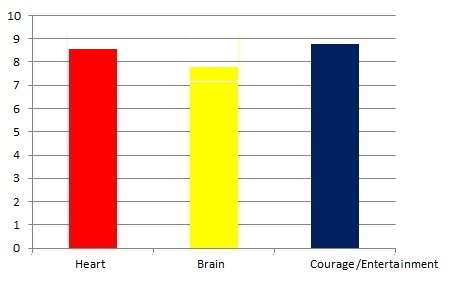 Main Page Alphabetical Menu Chronological Menu ______________________________________________________ |
The NYC Movie Guru
themovieguru101@yahoo.com
Privacy Policy